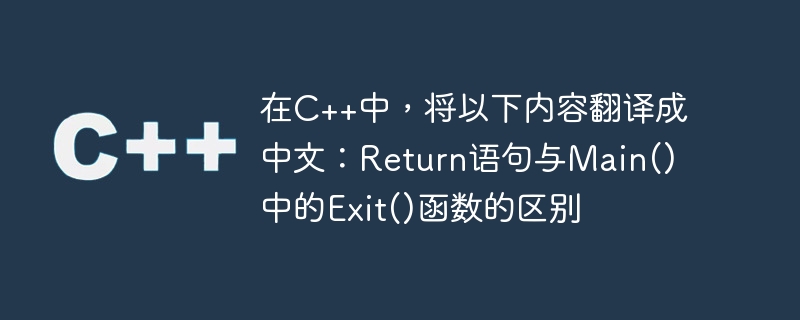
If you are a programmer, you write the code; If you write the code, you use the function; if you use the function, you use return and exit statements in every function. So In this article, we will discuss what a return statement and exit statement are and their differences.
In C++,
- return is a statement that returns the control of the flow of execution to the function which is calling.
- Exit statement terminates the program at the point it is used.
int main()
This is where the execution of the program begins. The program is executed from the main() function, and since we have int in place of the return type, it has to return some integer value. We can say this integer represents the program's status, where 0 means the program executes successfully. A non-zero value means there is an execution error in the code.
Return statement in main() function
A return statement always returns the control of flow to the function which is calling. Return uses exit code which is int value, to return to the calling function. Using the return statement in the main function means exiting the program with a status code; for example, return 0 means returning status code 0 to the operating system. Let us look at a C++ program using the return statement.
Example
#include <iostream>
using namespace std;
class Test {
public:
//To activate Constructor
Test() {
cout<<"Hey this is Return Constructor n";
}
//To activate Destructor
~Test() {
cout<<"Hey this is return Destructor";
}
};
int main() {
//Creating object of Test class
Test object;
//Using return in main
return 0;
}输出
Hey this is Return Constructor
Hey this is return DestructorLooking at the above program, we can say that return calls the constructor and destructor of a class object. Calling the destructor is essential to release the allocated memory.
Exit() statement in main function
Exit () statement terminates the program at the point it is used. When the exit keyword is used in the main function, it will exit the program without calling the destructor for locally scoped objects. Any created object will not be destroyed and will not release memory; it will just terminate the program.
Example
#include <iostream>
using namespace std;
class Test {
public:
//To activate Constructor
Test() {
cout<<"Hey this is exit Constructor n";
}
//To activate Destructor
~Test() {
cout<<"Hey this is exit Destructor";
}
};
int main() {
//Creating object of Test class
Test object;
//Using exit() in main
exit(0);
}输出
Hey this is exit Constructor观察程序的输出,我们可以得出结论:在程序中使用exit关键字意味着它不会调用析构函数来销毁分配的内存和局部作用域对象。
结论
通过本文,我们了解了return语句和exit语句之间的区别。从这些区别中,我们可以得出结论:在程序中使用它们会产生很大的差异。在使用exit而不是return时需要注意。然而,它们在一页代码上的影响不大,但在开发软件时影响很大。希望本文对您有所帮助。



